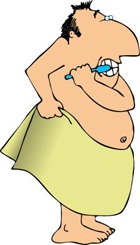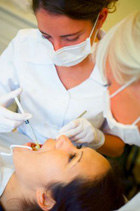 At night when you sleep, so does your saliva gland, the mouth becomes dry and acid is produced which eats into your protective enamel, says a Central Leeds dentist. It also causes bad breath and that’s why we are so dehydrated in the mouth when we wake up. The acid that is produced by the bacteria dies and becomes tartar which is deposited around our teeth at gum level, and this too is a major cause of bad breath. Most people will take water to bed with them and sip it throughout the night, this neutralises the production of bacteria and acid, and with it bad breath and erosion. If we practice this throughout our day routine, that will also prevent the problem to some degree. Flossing, brushing and rinsing are a good regime to have and in that order, but you need to get into a habit of doing it, even when we don’t always feel like it. Food debris is lodged in between our teeth, and into cavities. This is not good for our teeth as the acid produced simply burns away our protective layers of enamel and gives us not just infections, but bad breath. Don’t look on bad breath as a nuisance, look upon it as a sign that you`re not your job in keeping your teeth clean enough. It is true that odorous foods like garlic will give is a bad breath, as will certain diseases, but most likely the problem is a lax oral hygiene plan. Get advice from the hygiene nurse at your nearest practice.
At night when you sleep, so does your saliva gland, the mouth becomes dry and acid is produced which eats into your protective enamel, says a Central Leeds dentist. It also causes bad breath and that’s why we are so dehydrated in the mouth when we wake up. The acid that is produced by the bacteria dies and becomes tartar which is deposited around our teeth at gum level, and this too is a major cause of bad breath. Most people will take water to bed with them and sip it throughout the night, this neutralises the production of bacteria and acid, and with it bad breath and erosion. If we practice this throughout our day routine, that will also prevent the problem to some degree. Flossing, brushing and rinsing are a good regime to have and in that order, but you need to get into a habit of doing it, even when we don’t always feel like it. Food debris is lodged in between our teeth, and into cavities. This is not good for our teeth as the acid produced simply burns away our protective layers of enamel and gives us not just infections, but bad breath. Don’t look on bad breath as a nuisance, look upon it as a sign that you`re not your job in keeping your teeth clean enough. It is true that odorous foods like garlic will give is a bad breath, as will certain diseases, but most likely the problem is a lax oral hygiene plan. Get advice from the hygiene nurse at your nearest practice.





 Bad Breath is the bane of everyone, whether it is in your work place or just socialising in the local hostelries, we need to be close to people when we chat and that’s when the problem starts. A Leeds dentist explains that bad breath is usually an Oral Hygiene problem that results from a lax regime. Bad breath can also be a sign of a liver disease or other problem; it is a symptom of a few diseases so always seek medical advice if the problem persists. A good oral hygiene program is the best way to avoid bad breath; it is caused by the production of by-products in the mouth by bacteria which feeds off the residue food left behind after a meal. Bad breath in the morning is due to a dry mouth in the night, as the saliva gland is also asleep when we are asleep. Just keeping a glass of water beside the bed will help the problem. In the morning floss first as this will get in between the teeth and remove hidden debris, brush and rinse to remove any leftover bits of bacteria. Tartar will build up on the teeth and eats away at the enamel, so removing bad bacteria debris is also important throughout the daytime, especially after we have eaten a sandwich or even a bar of chocolate. The fat and sugar residue that gets in between our teeth is the food that bacteria feeds off and makes acid out of, so washing it away by swigging water and flossing is very important.
Bad Breath is the bane of everyone, whether it is in your work place or just socialising in the local hostelries, we need to be close to people when we chat and that’s when the problem starts. A Leeds dentist explains that bad breath is usually an Oral Hygiene problem that results from a lax regime. Bad breath can also be a sign of a liver disease or other problem; it is a symptom of a few diseases so always seek medical advice if the problem persists. A good oral hygiene program is the best way to avoid bad breath; it is caused by the production of by-products in the mouth by bacteria which feeds off the residue food left behind after a meal. Bad breath in the morning is due to a dry mouth in the night, as the saliva gland is also asleep when we are asleep. Just keeping a glass of water beside the bed will help the problem. In the morning floss first as this will get in between the teeth and remove hidden debris, brush and rinse to remove any leftover bits of bacteria. Tartar will build up on the teeth and eats away at the enamel, so removing bad bacteria debris is also important throughout the daytime, especially after we have eaten a sandwich or even a bar of chocolate. The fat and sugar residue that gets in between our teeth is the food that bacteria feeds off and makes acid out of, so washing it away by swigging water and flossing is very important. Oral cancer is a killer, but a preventative one. Cancer of the lips for instance is caused mainly by smoking and over exposure to the sun. Many of us tend to think of the sun giving us skin cancer, but it is emerging now that it also gives us oral cancer says a Leeds dentist. The symptoms of mouth, tongue and throat cancer are reddish lumps that are sore and often bleed. Once you find one get to your dentist or doctor straight away, ignoring it won`t make it go away. The cure rate is quite high, the treatments are not painful and your longevity will be increased, but only if you act quickly. Preventing oral cancer is all down to being sensible and taking precautions, your dental practice has a hygiene nurse to advise you, talking to them will enable you to make a sensible plan for keeping oral cancer from forming in your mouth. Being careful not to get too much sun ray exposure will also keep oral cancer away. Brushing the right way and flossing on a regular basis through the day is the best means to keep bad bacteria under control, and as this is the main cause of most oral and dental problems, it makes sense to have an oral hygiene format that is planned well. At night your saliva gland stops working, this will allow acid to build up and destroy the enamel on your teeth, by sipping water every time you wake up the acid will find it hard to do any serious damage. It is often the simplest of plans that work the best, so take the time to do a little research and plan your teeth cleaning regime well.
Oral cancer is a killer, but a preventative one. Cancer of the lips for instance is caused mainly by smoking and over exposure to the sun. Many of us tend to think of the sun giving us skin cancer, but it is emerging now that it also gives us oral cancer says a Leeds dentist. The symptoms of mouth, tongue and throat cancer are reddish lumps that are sore and often bleed. Once you find one get to your dentist or doctor straight away, ignoring it won`t make it go away. The cure rate is quite high, the treatments are not painful and your longevity will be increased, but only if you act quickly. Preventing oral cancer is all down to being sensible and taking precautions, your dental practice has a hygiene nurse to advise you, talking to them will enable you to make a sensible plan for keeping oral cancer from forming in your mouth. Being careful not to get too much sun ray exposure will also keep oral cancer away. Brushing the right way and flossing on a regular basis through the day is the best means to keep bad bacteria under control, and as this is the main cause of most oral and dental problems, it makes sense to have an oral hygiene format that is planned well. At night your saliva gland stops working, this will allow acid to build up and destroy the enamel on your teeth, by sipping water every time you wake up the acid will find it hard to do any serious damage. It is often the simplest of plans that work the best, so take the time to do a little research and plan your teeth cleaning regime well. Losing one, some or all of your teeth can be a very traumatic experience. Whether it is due to disease, dental decay or just as the result of an accident, the toothless smile is never a good look for anyone of any age. There are also a number of health reasons besides the aesthetic that mean that missing teeth are bad.
Losing one, some or all of your teeth can be a very traumatic experience. Whether it is due to disease, dental decay or just as the result of an accident, the toothless smile is never a good look for anyone of any age. There are also a number of health reasons besides the aesthetic that mean that missing teeth are bad. Preventing dental treatment is a better way for your dentist to help you keep your teeth in good order, and that’s exactly what they do best says a Central Leeds dentist. If you take your dentists advice then you`ll prevent gum disease and save yourself a lot of money and time in the chair. It isn`t common sense for your dentist to keep working on repairing your teeth, this just restricts their time and prevents them from taking on more patients. A good hygiene format is what will prevent teeth problems, and your practice has an experienced and well trained hygiene nurse whose job it is to advise you. Brushing with a good toothbrush and the right one too, will also go some way to keeping gum disease away. Flossing and a good mouthwash will also help. Gum disease is caused by bad bacteria that feeds off the food residue that is left every time we put food into our mouths. The bacteria produces acid which then wears down the protective enamel. It also gets onto the gums and makes them sore and soft, this causes bleeding which then allows the bacteria to enter the blood stream and cause havoc. This is the main cause of premature tooth loss in most adults. This can all be avoided by a simple, but affective oral hygiene regime. Carrying a flossing stick will also help, as we all tend to eat a snack in between meals. This is just as damaging as a full meal, in fact it is more damaging at times as these snacks tend to be sugary, and that’s what attracts the bacteria more. At night the saliva gland will go sleep when you do, this stops acid being neutralised and damages your teeth quite quickly. Just a simple thing like having a glass of water by the bed, and sipping it through the night, will go a long way to helping you keep your teeth longer.
Preventing dental treatment is a better way for your dentist to help you keep your teeth in good order, and that’s exactly what they do best says a Central Leeds dentist. If you take your dentists advice then you`ll prevent gum disease and save yourself a lot of money and time in the chair. It isn`t common sense for your dentist to keep working on repairing your teeth, this just restricts their time and prevents them from taking on more patients. A good hygiene format is what will prevent teeth problems, and your practice has an experienced and well trained hygiene nurse whose job it is to advise you. Brushing with a good toothbrush and the right one too, will also go some way to keeping gum disease away. Flossing and a good mouthwash will also help. Gum disease is caused by bad bacteria that feeds off the food residue that is left every time we put food into our mouths. The bacteria produces acid which then wears down the protective enamel. It also gets onto the gums and makes them sore and soft, this causes bleeding which then allows the bacteria to enter the blood stream and cause havoc. This is the main cause of premature tooth loss in most adults. This can all be avoided by a simple, but affective oral hygiene regime. Carrying a flossing stick will also help, as we all tend to eat a snack in between meals. This is just as damaging as a full meal, in fact it is more damaging at times as these snacks tend to be sugary, and that’s what attracts the bacteria more. At night the saliva gland will go sleep when you do, this stops acid being neutralised and damages your teeth quite quickly. Just a simple thing like having a glass of water by the bed, and sipping it through the night, will go a long way to helping you keep your teeth longer. The health of your teeth is very important. Just ask anyone who has suffered the pain of serious toothache or losing a tooth to infection. Cleaning with brushing and flossing is very important to remove plaque and keep your teeth safe from cavities and other dental traumas such as tooth abscesses. But it is important not to ignore the health of your gums, as these can be just as important to your overall oral health.
The health of your teeth is very important. Just ask anyone who has suffered the pain of serious toothache or losing a tooth to infection. Cleaning with brushing and flossing is very important to remove plaque and keep your teeth safe from cavities and other dental traumas such as tooth abscesses. But it is important not to ignore the health of your gums, as these can be just as important to your overall oral health. Preventing dental treatment is a better way for your dentist to help you keep your teeth in good order, and that’s exactly what they do best says a Central Leeds dentist. If you take your dentists advice then you`ll prevent gum disease and save yourself a lot of money and time in the chair. It isn`t common sense for your dentist to keep working on repairing your teeth, this just restricts their time and prevents them from taking on more patients. A good hygiene format is what will prevent teeth problems, and your practice has an experienced and well trained hygiene nurse whose job it is to advise you. Brushing with a good toothbrush and the right one too, will also go some way to keeping gum disease away. Flossing and a good mouthwash will also help. Gum disease is caused by bad bacteria that feeds off the food residue that is left every time we put food into our mouths. The bacteria produces acid which then wears down the protective enamel. It also gets onto the gums and makes them sore and soft, this causes bleeding which then allows the bacteria to enter the blood stream and cause havoc. This is the main cause of premature tooth loss in most adults. This can all be avoided by a simple, but affective oral hygiene regime. Carrying a flossing stick will also help, as we all tend to eat a snack in between meals. This is just as damaging as a full meal, in fact it is more damaging at times as these snacks tend to be sugary, and that’s what attracts the bacteria more. At night the saliva gland will go sleep when you do, this stops acid being neutralised and damages your teeth quite quickly. Just a simple thing like having a glass of water by the bed, and sipping it through the night, will go a long way to helping you keep your teeth longer.
Preventing dental treatment is a better way for your dentist to help you keep your teeth in good order, and that’s exactly what they do best says a Central Leeds dentist. If you take your dentists advice then you`ll prevent gum disease and save yourself a lot of money and time in the chair. It isn`t common sense for your dentist to keep working on repairing your teeth, this just restricts their time and prevents them from taking on more patients. A good hygiene format is what will prevent teeth problems, and your practice has an experienced and well trained hygiene nurse whose job it is to advise you. Brushing with a good toothbrush and the right one too, will also go some way to keeping gum disease away. Flossing and a good mouthwash will also help. Gum disease is caused by bad bacteria that feeds off the food residue that is left every time we put food into our mouths. The bacteria produces acid which then wears down the protective enamel. It also gets onto the gums and makes them sore and soft, this causes bleeding which then allows the bacteria to enter the blood stream and cause havoc. This is the main cause of premature tooth loss in most adults. This can all be avoided by a simple, but affective oral hygiene regime. Carrying a flossing stick will also help, as we all tend to eat a snack in between meals. This is just as damaging as a full meal, in fact it is more damaging at times as these snacks tend to be sugary, and that’s what attracts the bacteria more. At night the saliva gland will go sleep when you do, this stops acid being neutralised and damages your teeth quite quickly. Just a simple thing like having a glass of water by the bed, and sipping it through the night, will go a long way to helping you keep your teeth longer. Dental cavities are one of the most common health complaints in the UK every year. Millions of people each year need treatment for dental cavities of varying degrees of severity, but what exactly are cavities? What causes them and why do they require treatment?
Dental cavities are one of the most common health complaints in the UK every year. Millions of people each year need treatment for dental cavities of varying degrees of severity, but what exactly are cavities? What causes them and why do they require treatment? Bad breath can affect all of us at certain times. It can be particularly embarrassing and difficult because it is almost impossible to know if you are suffering from it. This is why so many people are anxious and resort to all sorts of lengths to make sure their breath is fresh. Just search the internet to see how many different cures and secret remedies are available if you part with your hard earned money. There is certainly a lot of money exploiting people’s anxieties and fears.
Bad breath can affect all of us at certain times. It can be particularly embarrassing and difficult because it is almost impossible to know if you are suffering from it. This is why so many people are anxious and resort to all sorts of lengths to make sure their breath is fresh. Just search the internet to see how many different cures and secret remedies are available if you part with your hard earned money. There is certainly a lot of money exploiting people’s anxieties and fears. The real secret to making sure you never have to face this awkward situation is to make sure that you are cleaning your teeth properly every day. This is because the majority of cases of bad breath are caused in the mouth, either by the presence of bad smelling bacteria or due to gum disease caused by ineffective brushing and flossing.
The real secret to making sure you never have to face this awkward situation is to make sure that you are cleaning your teeth properly every day. This is because the majority of cases of bad breath are caused in the mouth, either by the presence of bad smelling bacteria or due to gum disease caused by ineffective brushing and flossing.

